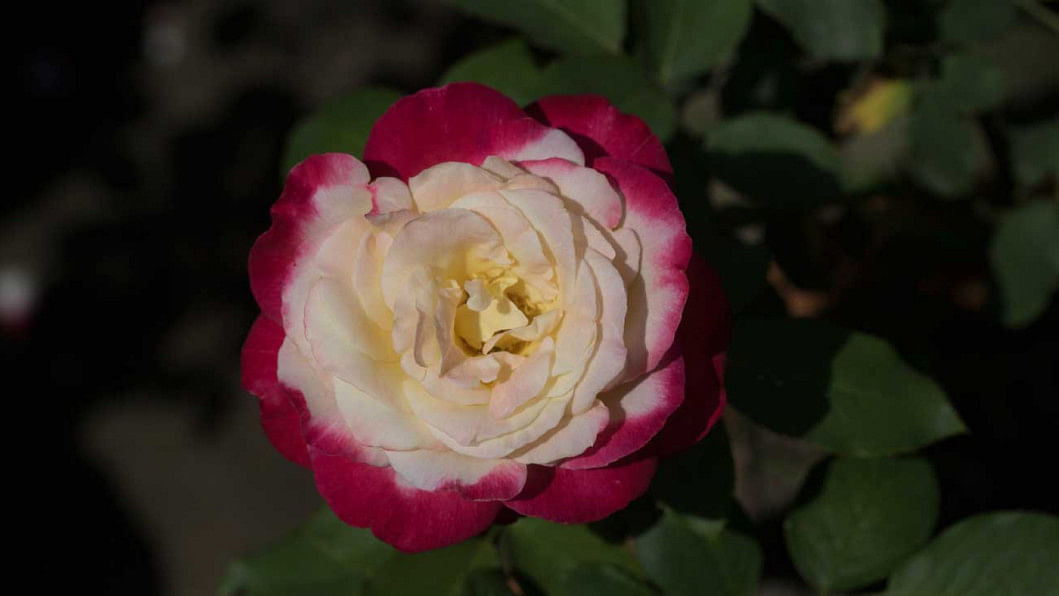ROSE GARDENING 101

You will find several kinds of roses in local nurseries. Rose plants can be bought in bare root form, which are often planted in small poly bags filled with fertile soil. These can be directly planted in the ground or in a pot.
There are potted rose plants too. Rose plants cost about Tk. 100-150 in bare root form and Tk. 200-400 in potted form.
Early spring is the ideal time to start rose gardening. You should buy and prepare these gardening supplies from the local nursery: pruning shears, gardening gloves, compost, fertiliser, cow dung and pesticide spray. You will need a shovel and spade to dig holes for planting the roses.
Pruning is the act of selectively removing parts of plants, such as branches, buds and roots which keeps plants healthy, and encourages blooms. It prevents rotting and disease.
Small curved shears are best for small to medium rose plants and shrubs. Cut at an outward facing slanted angle using the shear. Definitely cut off side stems that come out from underneath the ground, as these causes overcrowding and becomes a nest for pests. The main purpose is to allow for air circulation, so you have to cut off the branches and leaves in such a way so that the air can swirl in and out.
Compost is an essential ingredient for your plants. You will have to mix one kilogram of cattle fodder, also known as khoyl in Bangladesh, with one and half litre of water. You can buy khoyl from local nurseries for Tk. 80 to 100 per kilogram. Let the mixture stay wet for one week and it will be ready for use. Compost makes the soil fertile and is a must for making your plants healthy and bloom all year long.
Fertilisers are full of nitrogen, phosphorus and potassium which are a must for your plants. You can buy fertilisers or joibo shar from the local nursery for Tk. 80 per kilogram. Cow dung or gobor provides much needed nutrients and you can buy it from nurseries, costing approximately Tk. 70 per kilogram.
How to plant: Using a spade and shovel, dig up a hole about approximately fifteen to eighteen inches deep and wide. Make sure it is loose and not full of clay. If you are in an area where you cannot find soil with low clay content, then it is best to buy the fertile soil from a nursery. It will cost you about Tk. 60 for one kilogram of soil.
Get cow dung so that it measures up to one quarter of the soil dug up from the ground. If you are using a pot then collect cow dung so that it measures up to one quarter of the pot.
Now mix the soil with the cow dung and make a mound. Place this mound at the base of the hole in the ground or in the pot. Place the plant on the mound and press firmly so that it sits straight. Now place about two handfuls of wet khoyl or compost on the base of the plant. Then add one handful of fertiliser or joibo shar. Using a shovel put the soil back in the hole.
If you are using potted plants, then put the soil back into the pot, and crumble it so that it is loose. Press down firmly around the roots of the plant so that there are no air pockets. Pour about two cups of khoyl water on the soil. Then water the soil so that the soil is moist and damp.
Water the plant once every week. It is best to water in the morning. If you see that the soil is moist or wet, then do not water as overwatering will lead to late blooming of flowers. In fact, when you see that small buds have bloomed, then stop watering, even if the soil becomes dry. However, add two cups of khoyl - water from the khoyl and water mixture on to the plant every week. This will encourage all year blooms.
Regularly prune the plant, and check the leaves for black spots or any fungus. If you see any dying leaves on the soil or on the leaves, immediately prune these off as these are havens for harmful pests and fungi.
Add fertiliser every two to three months on the soil. Also use pesticide spray every three to four months. Summer brings a lot of pests so you will have to use pesticide spray more frequently then. You can use neem oil spray every other week on your plants to prevent fungal and pest growth. This is better than using chemical fungicides and pesticides that it does not harm the leaves as much. Avoid splashing of water directly on the leaves, as this encourages growth of black spot fungus.
Many times you will see that the leaves of your plant are very green, but there are no blooms. Then stop watering for two weeks. Do not also add khoyl water. Make sure that the plants get six to eight hours of sunshine and are pruned regularly. After two weeks, you will most likely see blooms.
Whether you see blooms or not, you must dig the soil as it must have become dry in two weeks of no watering. Then you will have to add khoyl water. This will encourage blooms.
Rose gardening is the perfect way to learn about love and nature, and March is the best time to start planting, so what are you waiting for?
Photo: Sazzad Ibne Sayed

 For all latest news, follow The Daily Star's Google News channel.
For all latest news, follow The Daily Star's Google News channel. 



Comments